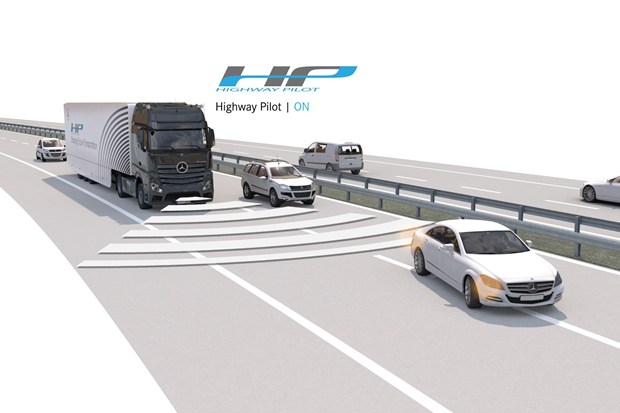Daimler driverless truck hits the road

- 05/10/2015
- Posted by: Simon Wait
- Category: News
Daimler Trucks ran a real-world test of what it says is the first series-production truck to operate on an automated basis on the highway.
The firm fitted its Highway Pilot self-driving system to a Mercedes-Benz Actros truck and sent it out on the Autobahn 8 near Stuttgart in Germany.
The truck used for the premiere is a standard Mercedes-Benz Actros equipped with the intelligent Highway Pilot system for this test of autonomous driving on public roads. A special permit from the state of Baden-Württemberg allows the truck to drive on motorways on an automated basis.
‘Today’s premiere is a further important step towards the market maturity of autonomously driving trucks – and towards the safe, sustainable road freight transport of the future,’ said Wolfgang Bernhard, the Daimler AG board member responsible for trucks and buses.
Like self-driving cars, driverless trucks are said to be much safer as they eliminate human error. But not only that, it’s also more efficient at changing gears, accelerating and braking. Which means it uses less fuel and gives off fewer carbon emissions.
Daimler’s system uses a short-range radar that reads the truck’s surroundings up to 70m away, while a long-range unit scans up to 250m away. These work with Active Cruise Control and Active Brake Assist, and a camera that identifies road markings and guides steering.
However, the driver must stay alert at all times, and be ready to take control when necessary. If they can’t, the truck will come to a safe stop.
Daimler emphasised that the Highway Pilot does not replace the driver, but supports and relieves the strain on him or her by dealing with monotonous stretches and taking care of annoying stop-and-go driving in a traffic jam. In automated mode the driver has control over the truck at all times and in tricky situations can take over driving of the vehicle again.
If the minimum prerequisites for the system are not present due to bad weather or missing road markings, the Highway Pilot issues acoustic and visual impulses to ask the driver to take over. If there is no reaction from the driver, the truck brings itself to a standstill independently and safely.
While the Highway Pilot does not need the Internet to work, Daimler said connectivity will increase in importance in the traffic of the future. Connectivity means not only the combination of all assistance, safety and telematics systems with the new sensor systems; it also encompasses intelligent networking between vehicles themselves and with the transport infrastructure.



